Our family has been living in an RV and traveling full-time for over 8 years. While there are dangers of living in an RV, we are all still healthy and thriving. Read on to learn important RV safety so you can enjoy your adventure!
RV Living Safety Key Takeaways
- Fire hazards, carbon monoxide, and mold are significant concerns in RV living.
- Driving and towing safety, along with campground and boondocking security, are important.
- Proper RV water filtration, RV tire maintenance, and keeping up with healthcare help guarantee a safe and healthy RV lifestyle.
(This post contains affiliate links. Purchases keep the lights on for this blog at no additional cost to you. See the Disclaimer.)
Learn how we score impossible & sold-out Camping Reservations in our FREE GUIDE HERE!
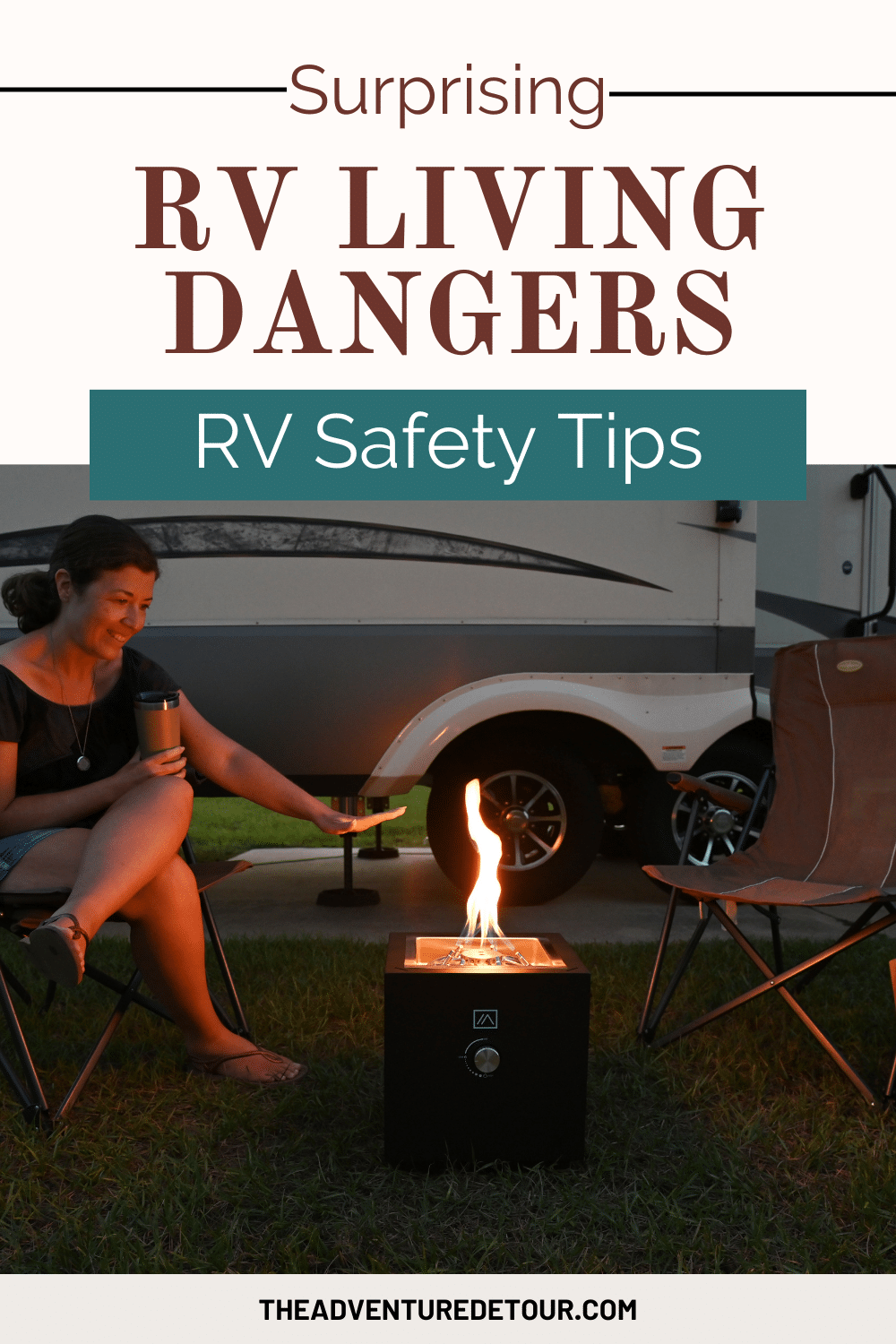
RV Living Is A Safe Lifestyle
Living in an RV has become an increasingly popular lifestyle choice for singles, couples, and families. The freedom, flexibility, and exciting adventures that come from heading out on a life on the road are very appealing.
However, as with any lifestyle choice, there are potential risks and dangers of living in an RV that must be considered.
From fire hazards and air quality issues to theft concerns and road accidents, there are numerous factors that could affect the safety and well-being of full-time RV travelers.
With the right precautions and the tips found in this article, most of these risks can be reduced, allowing you to relax and enjoy your journey.
1) RV Fire Hazards
When living in an RV, it’s important to be aware of the potential fire hazards. Here are some things to consider to prevent RV fires and keep your family safe.
Fires Can Spread Quickly In An RV
Due to the small space of recreational vehicles, fires can spread quickly and cause significant damage.
To minimize the risk of fires, ensure you have working smoke detectors installed and check the batteries regularly.
Also, keep some extra batteries to avoid the 2 a.m. chirping. Why on earth do the fire detector batteries always run out in the middle of the night?
Always keep a fire extinguisher within easy reach and make sure it hasn’t expired. Show all travelers how to use it properly.
RVs Are Made Of Flammable Materials
Many materials commonly used in the construction of RVs are flammable, such as wood, insulation, and upholstery.
This increases the risk of a fire spreading swiftly throughout your RV. Fire is one of the biggest dangers of living in an RV.
It’s crucial for you to be cautious when using any heat-producing appliances, high-wattage space heaters, or open flames, such as candles inside or near your RV.
RV Fires Quickly Jump Between Neighboring RVs
In RV parks, vehicles are often parked close together, which can lead to fires spreading rapidly from one RV to another.
It’s essential to keep a safe distance between your RV and your neighbor’s, as well as practicing proper fire safety measures.
Having a campfire in the close quarters of a campground is sometimes a bad idea, especially when it’s windy.
Once, we had an RV neighbor light a fire almost right under our bedroom slide.
Don’t be afraid to speak up if your neighbor needs to be reminded of fire safety. Unfortunately, not everyone has fire common sense.
RV Grills And Campfires
Cooking outdoors with grills and campfires can enhance your RV lifestyle and create a welcoming ambiance.
However, it’s essential to keep these fire sources far from your RV and follow safety guidelines to prevent accidental fires.
Set up grills and campfires in designated areas, preferably on non-flammable surfaces, and never leave them unattended.
Yes, propane and electric grills can also catch on fire. In fact, during our 8 years of RVing, we have witnessed 3 grill fires in campsites.
One RV grill fire was our own pellet smoker, which luckily was far enough away from our RV that it caused no further damage. Never grill right next to your RV!
Keep All Fire Sources Far From Your RV
To reduce the risk of RV fires, ensure all potential fire sources are kept away from your RV.
This may include items such as exterior propane tanks, portable generators, candles, and matches.
I know people love candles, but it just isn’t worth the risk with RVs.
Unattended Electric Space Heaters
Electric space heaters can provide a convenient source of warmth in an RV, especially during chilly weather.
They can also help to save money on propane.
However, using them without supervision and important precautions in your tiny home can create a significant fire risk.
Avoid Running Space Heaters In RV Underbelly Or Storage Bays
It is important to avoid placing space heaters in your RV’s underbelly or storage bays.
These areas house vital systems prone to freezing, such as water tanks, plumbing, and water hoses, so it can be tempting to use a space heater there.
However, putting a space heater in these confined areas can pose a fire risk.
Instead, find a safe and open location where the heater can effectively distribute heat throughout your living space.
Choose Space Heaters With Safety Features That Shut Off Automatically
To minimize hazards associated with space heaters, opt for models with built-in safety features like:
- Tip-over protection
- Overheat protection
- Automatic shut-off timers
These features can make a significant difference in preventing fires and keeping you safe while using the heater.
If the heater tips over or reaches a dangerously high temperature, these safety mechanisms will automatically shut off the device, minimizing risks.
Avoid Using Extension Cords with Space Heaters
Space heaters draw a considerable amount of electricity. It is generally advised to plug them directly into your RV’s electrical outlets.
Extension cords may not be equipped to handle the heater’s current draw and can become overheated, posing a fire hazard.
Remember to always turn off the heater when you leave your RV or go to bed, as unattended devices can pose a significant danger.
Following these precautions when using an electric space heater in your RV will help you stay warm while avoiding issues.
RV Refrigerator Malfunction
One of the dangers of living in an RV is dealing with a malfunctioning refrigerator.
An RV refrigerator is different from its residential counterpart, as it relies on electricity, propane gas, or both when running.
RV Refrigerator fires are the most common source of fires in recreation vehicles.
Check for Recalls
Always stay updated with product recalls for your RV refrigerator model to ensure that you’re aware of any potential issues that others have experienced.
Manufacturers may address safety issues, design flaws, or any other concerns that can affect your refrigerator’s performance and safety.
Checking for recalls helps you identify issues before they become a concern in your daily RV life.
Trust us when we say that there are many RV fridge recalls, which are common causes for RV fires.
We have owned our current RV for 5 years, and the refrigerator has already been recalled 4 times!
Also, make sure that your RV is level when parked, as most RV refrigerators that use propane require a level surface to work correctly.
An unlevel RV may lead to your refrigerator’s malfunction and reduce its efficiency.
If your fridge has issues with cooling or power, it may be due to your RV’s parking position.
RV fridges often use propane or 110 volts, depending on the mode you choose.
Make sure your refrigerator fits your RV’s power source and usage requirements to avoid unnecessary risks.
By staying up to date on the latest recalls for your RV’s refrigerator model, ensuring your RV is parked level, and troubleshooting both electric and propane power sources can help reduce the risks of an RV refrigerator malfunction and fire in camper living.
Old RV Batteries
Living in an RV full-time means constant travel in your nomadic lifestyle, and with that comes various challenges and dangers. One danger is old RV batteries.
Replace Battery As Needed To Prevent Issues
Old and worn-out batteries can be the cause of various problems as a full-time RVer.
Prolonging their use can result in a higher risk of emergencies, especially in crucial situations when you need power for essential systems in your RV.
It is helpful to regularly inspect your RV batteries to identify any issues before they become serious.
Keep an eye out for swelling, cracks, or leaking fluid. These are signs that your battery may need to be replaced soon.
RV Battery Life
Most RV batteries have a lifespan of 3 to 5 years, depending on their type and usage.
Keeping track of your battery’s age can help determine when it’s time for a replacement, ensuring a reliable power source for your RV.
We have, on average, replaced our fifth wheel battery about every 2 years.
When we had gone as long as 3 years, we ended up stranded down in the Florida Keys with a dead RV battery. Now we stay more up to date with replacing it.
Learn how we score impossible & sold-out Camping Reservations in our FREE GUIDE HERE!
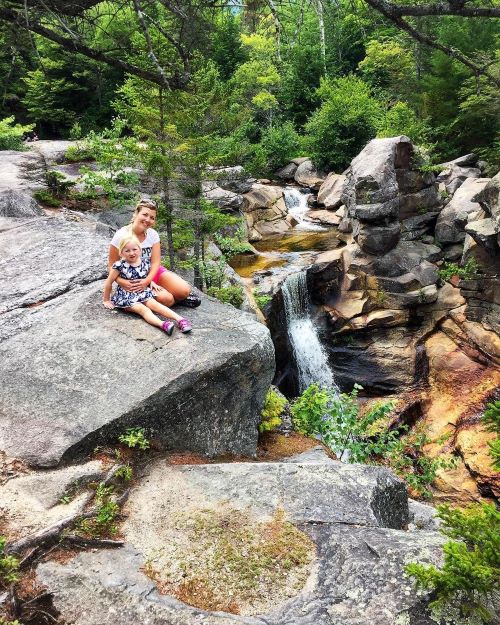
Tips to Protect Yourself From RV Fire Hazards and Prevention Measures
Know Where All RV Emergency Exit Windows are Located and Practice Opening Them
Familiarize yourself with the locations of all emergency exit windows in your RV and practice opening them regularly.
This ensures that in case of an emergency, you’ll be able to exit the vehicle quickly and safely.
We have noticed that if we don’t open our emergency RV exit windows frequently, they tend to get stuck.
That is the last thing you need to have happen when you have to get out quickly!
Have a Working Fire Extinguisher in an Easy To Grab Location
It’s important to have at least one working fire extinguisher in your RV, and it’s even better to have multiple extinguishers.
Place them in easy-to-reach locations, such as near cooking areas, near a bedroom, and by the door.
Having as many as 3 fire extinguishers can be helpful if your RV is larger and has a separate living area and bedroom.
Make Sure Everyone Traveling With You Knows How To Use A Fire Extinguisher
Knowing how to properly use a fire extinguisher is key to responding quickly in case of an RV fire. Teach everyone traveling with you how to use a fire extinguisher.
PASS Method To Properly Use A Fire Extinguisher
Teach the PASS method:
Pull the pin
Aim at the base of the fire
Squeeze the handle
Sweep the nozzle from side to side
Skip Campfires on Windy Days
Be cautious when starting a campfire near your RV.
On windy days, it’s better to skip campfires altogether, as the wind can quickly spread the flames or ashes, posing a serious risk to your RV and the surrounding areas.
Always follow the campground’s fire safety rules and guidelines. Some natural areas or national parks may prohibit campfires.
2) Humidity Is One Of The Biggest Winter Challenges Of Living In An RV
RV Interiors Need Air Flow
When living in an RV, maintaining proper humidity levels is important to prevent issues such as mold and condensation.
As a full-time RV dweller, you need to ensure that air flows properly throughout the interior to help manage humidity.
Proper ventilation is key, especially during winter RV living when the temperature differences between the inside and outside of your RV can dramatically increase condensation.
We notice that in our RV, the condensate begins to form with outside temperatures in the lower 50s or colder.
Use Vents, Fans, and Open Windows
Having a proper airflow system in place is vital for combating humidity.
Opening windows and using vents can provide a great way to circulate fresh air, particularly in high-moisture areas like the bathroom and kitchen.
When taking a hot shower or cooking, additional ventilation is necessary to remove excess humidity and steam from the air.
During warmer months, open windows to allow fresh air to enter and circulate throughout your RV.
However, during colder months, be cautious not to leave windows open for extended periods, as that can lead to heat loss and increased heating costs for full-time RV living.
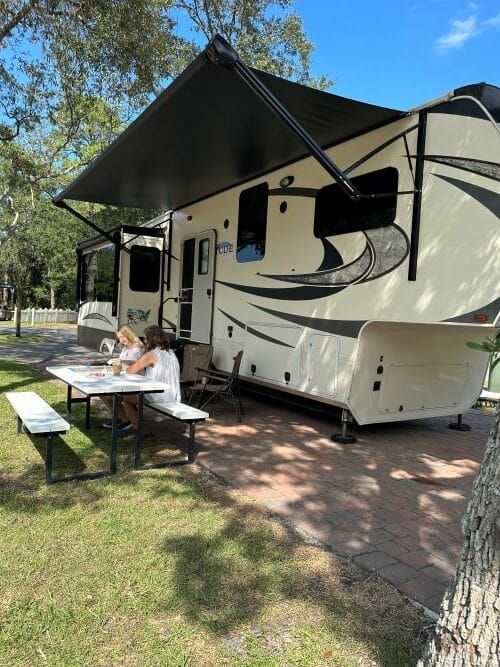
3) Mold RV Safety
Common RV Mold Locations
Mold is one of the biggest risks when living in an RV, especially in North America, where cold and winter weather can contribute to increased moisture levels.
Some common locations where mold tends to develop include closets, RV slides, and under mattresses.
It is important to regularly inspect these areas to prevent mold growth.
Tips to Control Moisture in Your RV
To reduce the chances of mold appearing in your RV, follow these tips:
- Keep air circulating by frequently opening windows and vents, which helps reduce humidity levels and prevent condensation.
- Try to minimize the introduction of moisture into your RV, such as avoiding bringing wet items (clothes, shoes, etc.) inside.
Run A Dehumidifier
Running a dehumidifier can make the biggest difference in controlling the moisture level inside your RV.
During cold weather or in high-humidity environments, using a dehumidifier can significantly help reduce the risk of mold growth.
We have found that we need a large dehumidifier to make a big enough difference.
Compact models simply don’t cut it, in our experience.
Use Eva-Dry In Closets Or Other Enclosed Spaces
For smaller areas like closets or other enclosed spaces, consider using an Eva-Dry product.
These compact and reusable dehumidifiers absorb excess moisture, helping to protect your belongings and prevent mold growth.
Install a Mattress Underlayment Mat Such as Den Dry to Prevent Mold
Investing in a mattress underlayment mat, like the Den Dry, can help prevent mold growth under your mattress.
These mats create a barrier between the mattress and the surface below, allowing air to circulate and preventing moisture from accumulating.
Add Extra Moisture Control When the RV is in Storage, Such as Damp Rid
When your RV is in storage, it’s particularly important to control moisture levels.
Products like Damp Rid can help absorb excess moisture, reducing the chances of mold developing.
Always Open Air Vents When Cooking or Showering
Finally, always remember to open air vents when cooking or showering inside your RV.
This will help release any steam or excess moisture, ensuring it doesn’t build up and contribute to mold growth.
Avoiding RV Leaks to Prevent Mold
Living in an RV can be a unique experience, but it also comes with the potential danger of RV leaks that can lead to mold growth.
Checking RV Roof Often for Damage
One of the most important things to do is to regularly inspect your RV roof for any signs of damage.
Look for cracks, tears, or loose seams that may allow water to seep into your RV’s interior.
Keeping your RV roof in good condition will not only prevent water leaks but also help reduce the risk of mold growth.
The goal is to check your roof at least once every couple of months, especially after heavy rains or hailstorms.
Always quickly address any issues you find to maintain a safe and mold-free living environment.
Apply New Caulking or Seals When Needed
Another crucial aspect of avoiding RV leaks and mold is to maintain proper sealing around the various openings in your RV, such as windows, doors, and roof vents.
Over time, caulking and seals can deteriorate, leading to leaking and mold growth.
To preserve your RV’s integrity and safety, periodically evaluate all caulking and seals and replace them when necessary.
When applying new caulking or seals, make sure to select high-quality, moisture-resistant materials designed specifically for use with your RV.
Not all roof materials are the same, and you need a product to match your RV.
It helps to keep extra roof lap sealant and caulk with you so you can touch up areas quickly if needed.
We spend a lot of time in Florida and have found that the extreme heat causes our RV roof caulking to crack easily.
Can Living in an RV Make You Sick?
Address Mold Right Away to Avoid Getting Sick
When you live in a limited space like an RV, even a small amount of mold growth can impact your health.
Is mold in a camper dangerous?
Yes, mold spores can cause allergic reactions, respiratory issues, and other health problems, especially if you have pre-existing conditions like asthma.
If you notice any signs of mold in your RV, take immediate action to address the issue.
Always seek professional help if needed to properly address the issue.
Learn how we score impossible & sold-out Camping Reservations in our FREE GUIDE HERE!

4) RV Carbon Monoxide Risks
From Your Own RV or Nearby RVs and Generators
Carbon monoxide poisoning is a real danger for those living in a camper full time.
This toxic gas can originate from your own RV’s appliances or even from nearby RVs and generators at campgrounds or truck stops.
The limited space inside an RV makes the risk of carbon monoxide poisoning higher than in a traditional home.
As a full-time RVer, you must take necessary precautions to protect yourself and your loved ones from this invisible threat.
Check Your RV Carbon Monoxide Detector
One great idea is to ensure you have a working carbon monoxide detector in your RV.
Regularly inspect and test your detector to make sure it’s functioning properly.
Many RVs come with a built-in detector, but it’s also a good idea to invest in a portable one that can be placed in different locations for better coverage.
Don’t forget to check the battery (if it’s not hard-wired into your RV) and replace it as needed to keep your detector reliable.
RV Carbon Monoxide Detectors Need to Be Replaced Every 5-7 Years
Keep in mind that carbon monoxide detectors have a limited lifespan.
Typically, they need to be replaced every 5-7 years, depending on the manufacturer’s recommendations.
We recently learned that our RV’s carbon monoxide detector was only good for 5 years, and we had to replace it.
Don’t take any chances with your safety by using an outdated detector.
Make a note of the replacement date to ensure you’re always protected so you can enjoy a safer RV lifestyle.
5) Propane Leaks or Explosions
Inspect RV Propane System Regularly
When living in an RV, it’s crucial to inspect your propane system regularly to avoid dangerous leaks or explosions.
This includes checking your combustion appliances, propane tanks, propane lines, and fittings to make sure they are in proper working condition.
Keep an eye out for any signs of corrosion, loose connections, or other potential hazards.
Replace any damaged or worn-out parts as needed to minimize safety risks.
Propane is an efficient fuel, but improper handling or neglecting maintenance can lead to severe consequences.
Get Professional Help for Propane Issues
If you suspect a problem with your RV’s propane system or aren’t comfortable handling the maintenance yourself, seek professional help.
Certified technicians can perform detailed inspections, diagnose issues, and offer the right solutions to keep you and your loved ones safe.
In addition, consider installing propane leak detectors close to the floor, as propane is heavier than air and tends to settle at lower levels.
These devices can provide an early warning in case of a leak, allowing you to take action before it becomes a dangerous situation.
Remember, your safety should always be a priority when living in an RV.
Regularly inspect your propane system, invest in necessary maintenance, and seek professional assistance if needed to prevent propane leaks or explosions.
6) Is Towing Or Driving An RV Safe?
Tips for Proper Towing to Prevent Accidents
Road accidents are a risk associated with RVs. When towing your RV, it’s important to follow safety measures and proper towing practices.
Evaluate your tow vehicle’s weight capacity and ensure you don’t exceed it when loading your RV.
When attaching the hitch, double-check that all connections are secure and reliable.
Additionally, while on the road, keep a safe distance from other vehicles and take your time during turns.
Are RVs safe to drive? Yes, but your best advice for safe towing is to drive slowly and remain vigilant and cautious at all times.
Don’t Get a Larger RV Than You Are Comfortable With
One of the common safety concerns of RV living is handling large Class A RVs or towing vehicles that are too big for your comfort level.
When considering an RV, choose one that best suits your comfort and driving ability.
Larger rigs might offer more space and amenities, but they can also put you in a dangerous situation if you’re not confident in maneuvering it.
So, it’s helpful to strike a balance between size and manageability.
Easier said than done! It’s honestly very tempting to get a big rig since this will be your home on wheels.
We have one, and it’s often a challenge to drive and park.
Avoid the Rear Swing When Towing a Trailer
A potential hazard to be aware of when towing a trailer is the rear swing.
This occurs when the back end of your trailer swings wide, potentially striking another vehicle or object near it.
To reduce this risk, always remain aware of your surroundings and practice slow, deliberate turns.
You can also invest in a rear-view camera to monitor your RV’s blind spots when making turns.
Using a spotter also helps when pulling into campgrounds.
Consider Practicing Towing in an Open Parking Lot
Before hitting the open road, one useful tip is to practice towing your RV in an empty parking lot.
This will give you a chance to familiarize yourself with driving or towing your specific RV.
Take the time to practice parking, turning, and reversing, as these are skills that can help you avoid safety hazards in real-life situations.
While it honestly takes a little while to get comfortable driving or towing a large RV, take it slow, and you’ll be well on your way to enjoying your RV adventures.
How Common Are RV Accidents?
RV accidents are more common than you might think.
A variety of factors contribute to this, such as inexperienced drivers and senior drivers who may be unfamiliar with handling an RV or camper.
In the United States, drivers are not required to have special licenses for RVs, so many people hitting the road may not have the adequate experience needed to safely operate these large vehicles.
It’s important to address the potential dangers associated with RV living, including the increased likelihood of accidents resulting from fatigue due to long driving, overweight towing, driving in bad weather, and driving at night.
Are RVs dangerous to drive? To reduce your RV accident risk, it’s crucial to travel light and invest in a strong hitch to ensure proper and secure towing.
We have towed our huge fifth wheel safely across 42 states so far by keeping our speeds low (max 60 mph) and by using a quality hitch (B&W Companion).
An RV Seat With A Seatbelt For Every Passenger
Living in an RV can be an exciting adventure, but it’s not the time to throw passenger safety to the wind.
One of these potentially overlooked risks, especially in van and motorhome safety, is the need for proper seats with seatbelts for every passenger on travel days.
As you embark on this exciting lifestyle, social media often showcases the fun and freedom that comes with living in camper vans and RVs.
However, it’s essential to remember the potential risks associated with traveling on the road without the right safety measures.
Is RVing safe? By making sure everyone has a seatbelt-equipped RV seat, you reduce the risk of injury during sudden stops, swerves, or accidents.
This includes rear seats with seatbelts, which are especially important for children.
In fact, some states require child passengers to use car seats or booster seats when traveling in an RV in the same way you would in a regular car.
Even living the motorhome lifestyle or van life requires proper seats and seatbelts while the vehicle is moving.
As tempting as it is to roll down the road while the kids are still in bed, it’s not safe and can be illegal, depending on the area.
It’s crucial to know your specific state or country’s regulations when it comes to seatbelts in RVs.
RV seatbelt laws can vary by region, and staying informed about these laws can make a significant impact on your overall safety on the road.
The laws apply not just to the state you reside in but also to states you are driving through.
Can Passengers Ride In A Travel Trailer?
You may be wondering, can a passenger ride in a fifth wheel trailer or travel trailer? There is a legal side to this question and a safety side.
It is never safe to allow passengers to ride in a towable trailer. Besides the fact that it is an extremely rough and uncomfortable ride, there are no seatbelts.
Laws regarding whether you can be in a camper while driving down the road in a towable depends on the state. Some states allow you to ride in trailers, some allow you to ride in a fifth wheel but not in a travel trailer, but it’s illegal in most states.
Learn how we score impossible & sold-out Camping Reservations in our FREE GUIDE HERE!

Have A Roadside Emergency Kit In Case Of Breakdowns
Living in an RV comes with its own set of challenges, and one of those is the possibility of a roadside breakdown.
It’s downright scary to be stuck in your RV on the side of the road, but it helps to be prepared when living in a camper.
Here are some key items and tips to consider when putting together a roadside emergency kit for your RV.
It’s helpful to have a fire extinguisher not only inside your RV but also in your tow vehicle.
It’s also important to invest in some basic roadside safety gear.
Items like reflective triangles, cones, or flares help to alert other drivers of your presence when you’re stopped on the side of the road.
Jumper cables, a tire pressure gauge, jacks along with a tire changing kit, and a flashlight with extra batteries are also valuable additions to your kit.
Lastly, ensure you have the means to communicate and get help during an emergency.
A charged cell phone with a portable power bank is helpful for calling for assistance during a breakdown.
It’s also a good idea to have roadside assistance coverage for added security and peace of mind.
Make sure your roadside assistance plan is specific to RVing, as regular roadside plans don’t have the resources to handle large RVs.
Check Out Good Sam RV Roadside Assistance
Avoid Driving in High Winds
Check the Forecast and Avoid Driving Your RV When It’s Too Windy
When planning your RV trip, it’s essential to keep an eye on the weather forecast. High winds can make driving an RV not only challenging but also dangerous.
Tips For RVing In Windy Conditions
- Monitor the weather conditions: Always check the forecast before hitting the road, especially if you’re planning a long trip. This will help you identify potentially dangerous wind and weather conditions that could impact your journey. Our family likes to use the Wind Finder App.
- Be cautious with wind speeds: When driving an RV, it’s best to use caution with wind speeds above 30 miles per hour and consider a change of plans for 45 mph or higher. High winds can make it difficult to maintain control of your vehicle, increasing the risk of an accident. If you find yourself in a windy situation, consider delaying your journey or seeking an alternate route.
- Reduce your speed: Slowing down is crucial when faced with high winds. By reducing your speed, you can better control your RV and minimize the impact of wind gusts on your vehicle. Remember, the larger and taller your RV, the more susceptible it is to wind.
- Stay alert and maintain a firm grip on the steering wheel: Be prepared to counteract sudden gusts of wind that may cause your RV to swerve. Keeping both hands on the wheel ensures that you can quickly react to any unexpected changes in wind direction.
- Know your RV’s limit: Different RVs can handle varying wind conditions. For example, driving a Class A RV in windy conditions is different than a towable. Familiarize yourself with your particular RV’s capabilities and how it responds to high winds. This information can help you make the best decision on whether it’s safe to continue driving during windy conditions.
Always remain cautious, be proactive in checking the forecast, and remember that sometimes the best decision may be to pull over and wait for better conditions.
The Roads Are More Dangerous at Certain Times
Avoid Driving an RV in Snow and Ice
When living in an RV, it’s essential to be cautious or avoid traveling altogether in bad weather conditions.
Snow and ice present a significant danger, as they can lead to accidents and difficulty controlling your RV.
One of our good friends hit a patch of black ice and flipped the truck and fifth wheel that was carrying their family.
Luckily, they all walked away from the accident, but it is never worth the risk.
During winter months, consider staying put or seeking out areas with milder weather to minimize your risk.
RVs Are Also Included When Snow Chains Are Required
In some areas, snow chains are required for all vehicles, including larger ones like RVs, to ensure safety during winter months.
If you absolutely must travel with your RV in winter, familiarize yourself with snow chain requirements for your route.
It may also be helpful to practice installing the chains before you set off on your journey, ensuring you’re prepared in case the need arises.
Consider Only Driving an RV During the Day
Driving during daylight hours not only provides better visibility but it also helps you stay aware of the ever-changing weather conditions.
When possible, plan your RV trips during the day, and avoid driving when visibility or road conditions are compromised.
It can make a significant difference in your reaction time, ability to navigate, and overall safety.
You can also avoid hitting something in a campground when pulling in and parking in the dark.
This can be a common source of RV damage.
Try to Skip Going Through Major Cities During Rush Hour
Navigating through major cities can be stressful and challenging in an RV, especially during rush hour.
Traffic congestion puts you at a higher risk for accidents and requires constant attention to your surroundings.
RVs don’t stop on a dime, and stop-and-go traffic or having to slam on your brakes can be both stressful and scary.
To minimize the risk, plan your route to avoid driving through urban areas during peak traffic times.
Adjust your schedule, if necessary, to maintain safety and improve your travel experience.
Bad Drivers
There will always be bad drivers wherever you travel, but something about driving an RV makes you feel like a magnet for them.
We often feel like we drive with a sign on the back of our RV that says, “Cut me off, and then slam on your brakes!”.
Here are some things you can do about it.
Consider Using a Dash Camera
Having a dash camera in your RV can provide an extra layer of security and evidence in case of an accident involving bad drivers.
It constantly records your driving, making it easier to determine who was at fault in case of an incident.
Allow Extra Stopping Room
Driving an RV requires more stopping distance than a standard vehicle due to its size and weight.
It’s important to maintain a safe distance from other drivers to avoid collisions caused by sudden stops or unpredictable behavior.
Keep in mind that bad drivers may not be aware of the increased stopping distance needed for an RV, so it is important to give yourself extra space to account for any unanticipated actions of other motorists.
People Will Cut You Off
Unfortunately, dealing with aggressive drivers is a fact of life on the road, and they will cut you off when driving your RV.
In these situations, it is helpful to remain calm.
Do not engage in any retaliatory behavior, as this can escalate the situation with aggressive motorists and lead to an accident.
Instead, focus on maintaining a safe and constant speed to ensure your own safety.
Learn how we score impossible & sold-out Camping Reservations in our FREE GUIDE HERE!
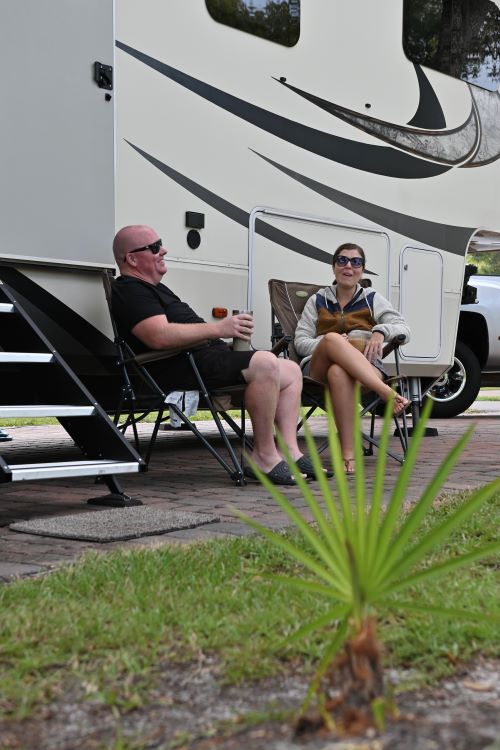
Items in RVs Can Become Projectiles
During an accident or sudden stop, unsecured items inside an RV can become dangerous projectiles.
These flying objects can cause significant injuries to passengers and damage to your RV.
Secure Items in Your RV or Vehicle
When packing your RV, make sure to secure all belongings that could become projectiles in the event of an accident or sudden stop.
Some practical steps you can take include:
- Store heavy and bulky items low to the ground and close to the center of the vehicle. This helps to stabilize the RV’s weight and reduce the risk of objects shifting while driving.
- Use straps, bungee cords, or cargo nets to tie down items and prevent them from moving during abrupt turns or sudden halts.
- Invest in high-quality latches for your RV to ensure that doors and drawers stay closed while in motion.
- Organize smaller items in clear, stackable storage bins with secure lids to prevent them from spilling out in the event of an accident.
By taking the time to secure your belongings properly, you can minimize the risk of injuries and damage to your RV.
Use Pet Seatbelts or a Kennel
If you’re traveling with pets in your RV, their safety should be a top priority, too.
In the event of an accident, an unrestrained pet can become a projectile, causing injury to themselves and others in the vehicle.
To protect your furry friends and ensure their safety during travel, consider using a pet seatbelt or a secure kennel.
Pet seatbelts are designed to keep your pet restrained during sudden stops, while a kennel can provide an enclosed space for your pet to safely ride in the RV.
Trailer Towing Safety
Avoiding Sway while Towing
When you’re towing a trailer, it’s important to ensure that you maintain control of your vehicle at all times.
One issue that can arise is trailer sway, which occurs when your trailer begins to move from side to side, affecting your control.
To avoid sway while towing, follow these steps:
- Distribute the weight in the trailer evenly, keeping the center of gravity low.
- Install an appropriate sway control system, such as a friction sway control bar or a weight distribution hitch with built-in sway control.
- Make sure your tow vehicle’s tires are properly inflated and well-maintained.
- Keep a safe distance from other vehicles and avoid sudden maneuvers or high speeds.
- Adjust your driving to compensate for windy conditions, as wind can significantly contribute to trailer sway.
Make Sure Your Tow Vehicle Has the Towing Capacity for Your Trailer Weight
Before you hit the road, ensure that your tow vehicle has the capacity to handle the weight of your trailer.
Overloading a tow vehicle can lead to reduced control, damage, and even accidents.
To determine your tow vehicle’s maximum towing capacity, consult the owner’s manual or manufacturer’s specifications.
Then, calculate the total weight of your loaded trailer, including all cargo, water, fuel, and any additional equipment.
To stay within your tow vehicle’s limits:
- Remove any unnecessary items from the trailer to reduce weight.
- Travel with empty RV tanks.
- Plan your packing strategically, keeping heavier items closer to the trailer’s axle to balance the weight distribution.
- Upgrade your tow vehicle’s suspension, brakes, or transmission if needed to handle the additional weight.
- Ensure you’re using the right type of hitch for your trailer and tow vehicle, such as a weight-distribution hitch or a fifth-wheel hitch, to properly distribute the weight.
Trailers and Motorhomes Have Weight Limits
Overloading an RV is a Safety Risk
When you’re living in an RV, it’s essential to be aware of the weight limits for your trailer or motorhome.
Exceeding these limits can create significant safety risks and potential damage to your vehicle.
One of the most critical aspects to consider is the Unladen Vehicle Weight (UVW), sometimes referred to as the dry weight.
This term describes the total weight of your RV when it’s entirely empty of cargo and water.
Another important measure is the Cargo Carrying Capacity (CCC), which represents the additional weight your RV can safely carry.
When towing your RV, always take into account the total combined weight of your dry trailer weight and your cargo.
Not overloading your RV is important for maintaining control on the road and preventing accidents.
Exceeding the weight limits may not only damage your suspension, brakes, and tires but also make your RV more difficult to control, reduce its fuel efficiency, and increase the risk of tire blowouts.
During your time in an RV, remember to:
- Regularly check the weight of your cargo and water.
- Distribute the weight evenly to maintain balance.
- Be cautious with adding aftermarket modifications, as they can increase the total weight.
- Ensure your towing vehicle has the appropriate towing capacity.
Stay alert and aware of the risks associated with overloading, and make any necessary adjustments to maintain a safe and secure environment for yourself and others on the road.
Keep Your Speeds Down when Towing an RV
Safe Towing Speed is Around 60 mph
When towing an RV, it’s essential to maintain a safe speed to avoid accidents and protect both you and others on the road.
As a general rule, you should aim to stay around 60 mph or less.
Traveling at higher speeds than this can increase the risk of swaying, which can be very dangerous and lead to loss of control over your vehicle and RV.
For example, in California, unless posted, any vehicle towing a trailer must follow a 55 mph speed limit on freeways.
There are a few things you should consider when towing an RV to ensure you maintain a safe speed:
- Road conditions: Always be aware of the current road conditions and adjust your speed accordingly. Wet, icy, or windy roads can make towing more challenging and require you to drive slower than usual.
- Traffic: Keep an eye on the traffic around you and adjust your speed to keep up with traffic flow, but not exceed the recommended safe towing speed. This helps prevent possible rear-end collisions and ensures you don’t impede the flow of traffic.
- Vehicle capabilities: Be aware of your tow vehicle’s limitations and capabilities. Some vehicles may not be able to maintain a constant speed of 60 mph when towing an RV, especially on inclines. Know your vehicle’s limitations and plan your route accordingly.
- Braking distance: Towing an RV increases the required braking distance, so it’s crucial to maintain a safe following distance from the vehicle in front of you. This allows for more time to react if you need to slow down or stop suddenly.
By keeping your speeds down and being aware of your surroundings, you can help prevent accidents and ensure a safe and enjoyable journey.
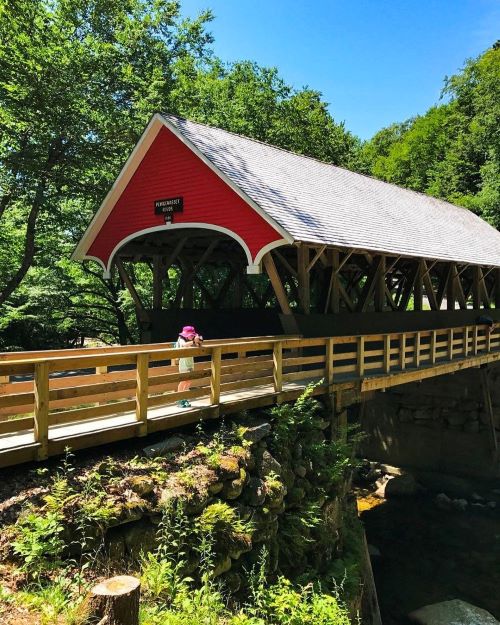
7) Low Clearance Issues
Know the Height of Your RV
Find out the exact height of your RV to prevent accidents involving low clearances.
Many RV owners surprisingly do not know how tall their RV is.
Measure the height of your vehicle, including any roof-mounted accessories, before hitting the road.
Then, you will be able to quickly determine whether or not your RV will pass safely under certain bridges or avoid low-hanging tree branches.
Use an RV Safe GPS
To take an extra step in ensuring safe travels, invest in an RV-specific GPS system.
These devices take into account the height and dimensions of your rig in order to access suitable clearance data.
With this information, the GPS can guide you through routes that safely accommodate your vehicle.
The use of an RV-Safe GPS can significantly reduce your risk of encountering low clearance issues.
Get your 7 Day FREE TRIAL of RV Life Pro trip planner + RV Safe GPS
Look out for Low Bridges and Low Trees
Even with your RV height knowledge, it is essential to remain vigilant while driving your RV.
Be on the lookout for low bridges and trees while traveling in unfamiliar areas.
Look for warning signs that indicate low clearance ahead and prepare to take an alternate route if necessary.
In rural or wooded areas, pay close attention to the road, as low-hanging branches may not be properly marked.
Our RV is 13′ 6″ tall, so the risk is high to hit low trees. We often have problems with trees in campgrounds as well.
It helps to walk the campground when you arrive to find out if there are low trees or tight turns to avoid on the way to your campsite.
Avoid Gas Station Pump Canopies
Gas station pump canopies can pose a risk to your RV as these structures often have a lower clearance than bridges or overpasses.
The canopy height is also unmarked, so you don’t know for sure if it is safe.
Truck Stops Are A Safer Choice
To reduce this danger, opt for a truck stop whenever possible.
These facilities are designed specifically to accommodate larger vehicles, including RVs, and have higher clearances than standard gas stations.
In addition to catering to larger heights, truck stops often offer extra amenities for travelers, making them a safer and more convenient choice.
Don’t Triple Tow
Triple Towing is Not Legal in All States
When considering taking your RV on the road, it’s essential to be aware of the legal limitations regarding triple towing.
Triple towing refers to the practice of towing two trailers behind a vehicle.
It is not legal in all states. For example, it’s allowed in states like Arizona, California, Iowa, and Colorado but not legal in Georgia, Florida, and Kansas.
You should always confirm the laws in each state you’re planning to travel through.
It’s Not Worth the Safety Risk
Another crucial aspect to consider is the safety risk associated with triple towing.
Towing a heavy load behind your RV can lead to various challenges:
- Limited visibility: With an extended length, you may find it difficult to monitor your surroundings and maneuver through tight spaces.
- Increased braking distance: The extra weight of the trailers will demand a longer distance to come to a complete stop. This can heighten the risk of accidents.
- Difficulty changing lanes: Changing lanes will pose challenges due to the combined length and weight of your vehicle and the trailers. Sudden movements may lead to a loss of control.
Make sure to research your route and check state laws before attempting this towing setup, and prioritize the safety of yourself and others on the road.
Don’t Allow Passengers To Ride Inside Travel Trailers Or Fifth Wheels While Towing
Not Safe To Ride In A Trailer While Towing
When towing a travel trailer or fifth wheel, safety is a priority. One risk to be aware of is never allowing passengers to ride in the trailer while it’s being towed.
You might assume it’s a comfortable place for passengers to relax, but doing so can put them in danger.
Trailers and fifth wheels are not designed to provide the same level of protection as passenger vehicles.
In the event of an accident, the trailer lacks essential safety features such as airbags and crumple zones.
Furthermore, passengers riding in a towed trailer do not have access to seat belts, increasing the risk of injury.
Illegal in Many Places
Traveling with passengers in a trailer or fifth wheel while towing is not only unsafe but also illegal in many states.
Laws and regulations vary by state, but some states allow passengers within fifth wheels while prohibiting riding in travel trailers while going down the road.
For example, in California, Montana, and Oregon, you can ride in fifth wheels but not in travel trailers while towing.
States like Florida, Georgia, and Kansas prohibit riding in any trailers while towing.
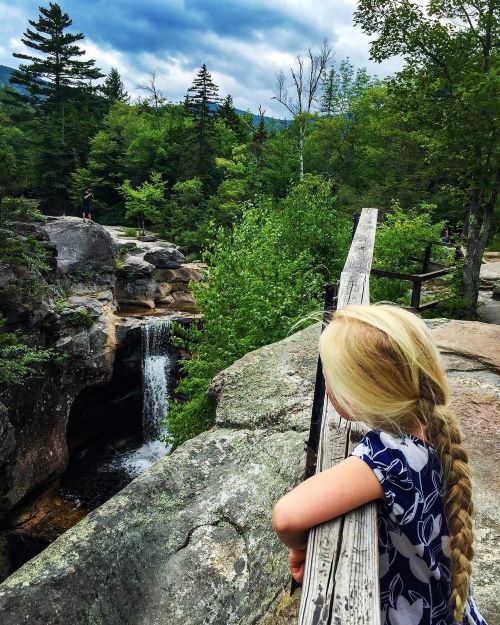
Consider Upgrading Large Trailers to Disc Brakes
When living in an RV, safety should be a top priority, especially while towing a large trailer.
An important upgrade to consider for your trailer is switching from drum brakes to disc brakes.
Disc brakes can significantly improve the stopping power and overall safety while on the road.
One standout advantage of disc brakes over drum brakes is their ability to dissipate heat more efficiently.
This feature reduces the risk of brake fade, which can occur when brakes consistently overheat, leading to a decrease in stopping power.
Brake fade can be particularly dangerous when towing a heavy trailer, so the improved heat dissipation of disc brakes is crucial.
The efficiency of disc brakes results in faster braking times and smoother operation.
With the increasing weight of modern trailers and the decreasing weight of towing vehicles, having an efficient braking system is key.
If you’re living in an RV and frequently towing a large trailer, upgrading to disc brakes should be a strong consideration to enhance your safety and overall experience on the road.
Plan Your Travel Days Ahead of Time
When living in an RV full-time, it’s important to plan your travel days ahead of time.
Careful planning not only helps you avoid unexpected hazards or inconveniences but also allows you to make the most of your time on the road.
One of the things to consider when planning your trip is the distance between destinations.
This is crucial because it helps you decide how much time you’ll spend driving and when and where you will need to stop for gas.
Planning your route ahead of time allows you to prevent low clearance stops for gas and along your route.
Remember to schedule enough time for rest stops, meals, and breaks, keeping in mind that driving an RV requires more concentration and effort than a regular car.
Campgrounds also fill up quickly and it can be tough to get a reservation in the more popular parks.
Grab our FREE Guide to learn how all of our hacks to score even the toughest camping reservations!
Get your Camping Reservations Hacks
FREE GUIDE HERE!
One of our biggest secrets to getting even sold-out campsites is to use Arvie.
Arvie searches for campground cancellations and books the site for you if it becomes available. It’s really a game-changer!
By planning your travel days ahead of time, you can ensure a more enjoyable and stress-free journey while living in your RV full-time.
Get your Arvie FREE TRIAL HERE + 10% off to check it out for yourself!
8) Theft & Break-Ins
Extra Security Isn’t Expensive For Peace Of Mind
When living in an RV, it’s essential to keep in mind your safety and the risks associated with theft.
Are RVs safe to live in? Yes, however investing in extra security measures doesn’t have to be expensive, and it can significantly reduce break-ins and theft incidents.
Some affordable security options include installing security cameras around your RV and implementing a high-quality lock system on doors and storage compartments.
Additionally, a well-lit exterior can deter potential thieves from targeting your vehicle.
By taking these simple precautions, you can minimize the chances of experiencing break-ins or theft and maintain a safe living environment in your RV.
Tourists Can Be More Vulnerable
While living and traveling in an RV might expose you to new adventures and experiences, it can also make you more vulnerable to petty theft.
Tourists are often targeted by thieves because they may not be familiar with local customs and may appear less vigilant or less guarded with their belongings and valuables.
To reduce your vulnerability, it’s important to stay aware of your surroundings and secure your valuable belongings when traveling to new locations.
Avoid leaving valuables in plain sight, and consider using a lockable safe to keep passports, jewelry, and other items secure within your RV.
Keep Your Campsite Secure with These RV Campground Safety Tips
Are RV parks safe? When you’re living in an RV, maintaining security at your campsite is an important safety step.
- Obey campground rules: Campgrounds typically have strict safety rules in place to protect their guests. Make sure to follow these rules to keep you and other campers safe.
- Lock up: Always lock your RV’s doors and windows when you leave, even if it’s just for a short while. This simple measure can greatly deter thieves and curious wildlife. Additionally, remember to secure your exterior storage compartments. Don’t forget to lock up your bikes!
- Invest in a security system: If it’s within your budget, consider installing an RV security system. This can provide an extra layer of protection against break-ins, especially when paired with a motion detector light that illuminates your campsite when any movement is detected.
- Choose a well-lit and safe location: When selecting your campsite, choose a spot that offers ample lighting and looks secure. Avoid areas that are secluded or close to potential hazards, such as flooding zones.
- Get to know your neighbors: Introduce yourself to fellow campers nearby. This not only allows you to establish a friendly atmosphere but can also help create an informal security network. If you look out for each other, it will be easier to detect any suspicious activities around your campsite.
- Be vigilant: Keep an eye on your possessions and be aware of your surroundings. If something looks out of place or suspicious, don’t hesitate to bring it up with campground staff or other campers.
Are campgrounds safe? Yes, we have felt safe in almost every campground we have ever stayed in.
We did have a bike stolen in a campground in Palm Springs, CA, but it was partly our fault because we forgot to lock it up.
If for some reason you get a bad feeling, simply pack up and leave. Your home is on wheels for a reason!
Locking Trailer Hitch Or Pin Box When RV Is In Storage
To protect your RV from theft when it is not in use or in storage, it is important to properly secure the trailer hitch or pin box.
To begin with, you should invest in a high-quality hitch lock or pin box lock specifically designed for your type of RV.
These locks serve as a deterrent to potential thieves and make it difficult for them to hitch your RV to their vehicle and drive away.
In addition to using a hitch lock, try parking your RV in a well-lit, secure location.
The more visible and less accessible your RV is to potential criminals, the lesser the probability of an unsuccessful theft attempt.
Fenced or gated storage facilities with surveillance are preferable, as they provide an additional layer of security.
You can also consider investing in a GPS tracker for your RV.
This will help track your RV’s location in case it is stolen, increasing the chances of recovering it.
Are RV Locks Universal?
Consider Changing Your RV Locks
Many RV locks are considered universal, making it wise to consider changing or upgrading your RV locks to increase security.
Although most RV door locks can fit different models, it’s helpful to measure the exact size of the hole the lock fits into before purchasing a new lock.
Make sure to get a replacement lock with the same diameter and depth as the one you’re replacing.
One factor to be aware of when discussing the universality of RV locks is the use of master keys or passkeys.
Many RV door locks have been keyed with passkeys for decades, allowing multiple people to potentially gain access to your RV.
To determine whether your RV door lock uses a passkey, look for a small letter (C, D, E, etc.) next to the keyhole.
If a letter is present, this indicates which lettered passkey can unlock it.
An excellent upgrade option is to consider installing keyless entry systems, which eliminates the need for traditional keys while beefing up security.
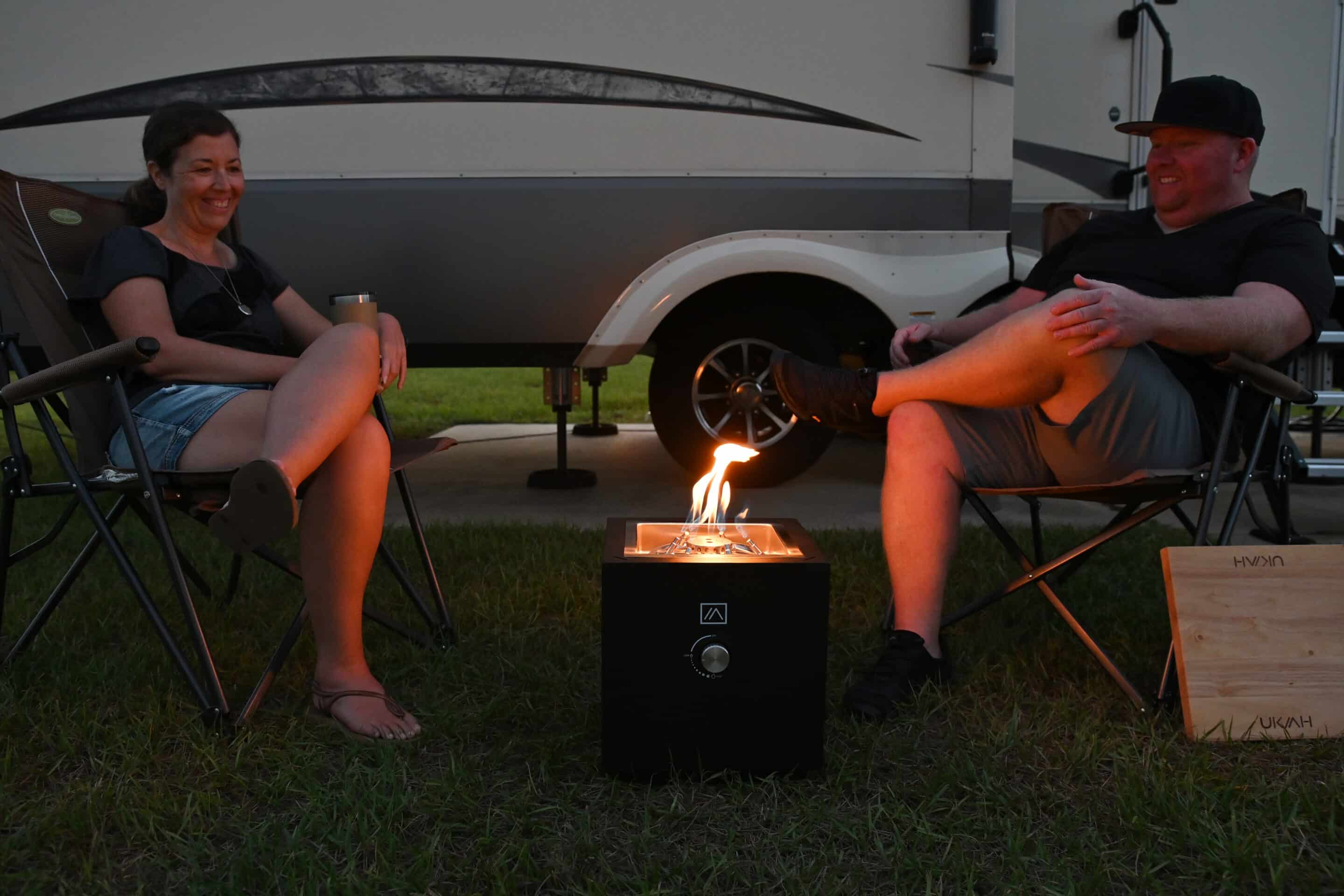
8) You Can Be Vulnerable To The Elements When Traveling In An RV
Wildfires
Living in an RV, you can be vulnerable to wildfires. RVs can catch fire quickly because of their construction materials, and it is challenging to control a fire once it begins.
To keep yourself safe, closely monitor news reports about wildfires in your area and have an evacuation plan in place.
Weather Events
Heavy rainstorms, hail, and high winds are just some of the weather events that can cause damage to your RV.
It is crucial to prepare for inclement weather, adequately secure your RV, and have an emergency plan when unexpected weather events occur.
Hurricanes
Hurricanes can bring high winds and flooding to an area, and RVs offer limited protection against these dangers.
Is it safe to live in a camper during a hurricane? Not usually. This of course depends on how close you are to the storm’s path.
The best course of action is to evacuate your RV well in advance of a hurricane’s arrival to ensure your safety.
The storm path can change last minute, so you want to travel as far away from it as possible.
Tornadoes
Tornadoes can form quickly and bring destructive winds that can cause significant damage to RVs.
When you live in an area prone to tornadoes, be aware of weather conditions, have a plan to find shelter in a sturdy building, and ensure that you have enough time to reach safety before a tornado reaches your location.
A tornado warning in your county/area means it is time to find shelter immediately other than your RV.
Floods
RVs are not designed to withstand floods, which can cause damage to the vehicle and put your safety at risk.
To protect yourself, avoid areas prone to flooding, and evacuate your RV if flood warnings are issued.
Solution: Install Phone Apps With Alerts And Evacuate Early If Necessary
One of the best ways to protect yourself from the elements while living in an RV is by using technology to stay informed about potential dangers.
There are many phone apps that can provide weather alerts and updates, allowing you to make decisions about when to evacuate or find a safer shelter.
9) Injuries Can Happen In Your RV
Falls on RV Stairs – Consider Securing Bouncing Stairs or Upgrading to Solid Step
While living in an RV can be an exciting experience, it also comes with its own set of potential risks, such as falls on the RV stairs.
As you navigate the stairs of your RV, you may encounter unstable or bouncy steps that can contribute to injuries.
To prevent accidents, consider securing bouncing stairs or upgrading to a solid step system.
Solid RV steps offer more stability and a safer surface for entering and exiting the RV.
Head Injuries on RV Slides and Hatches
In addition to falls on stairs, head injuries can also occur when bumping into low-hanging RV slide-outs or hatches.
Slides provide extra living space when parked but can become unintentional hazards if forgotten about when moving around the RV.
In order to reduce the risk of head injuries, make a habit of being aware of your surroundings and take proper precautions.
For instance, attaching pool noodles or foam padding to the edges of slide-outs can help cushion any accidental impacts.
10) RV Park Safety
When staying at a campground, you may feel a sense of increased security due to the presence of other campers, campground management, and the generally regulated environment.
Is it safe to live in an RV full-time in campgrounds? Generally yes, however, it’s still important to take precautions for RV park safety:
- Choose a reputable campground: Research your campground options and read reviews to gauge the level of safety and amenities you can expect.
- Secure your belongings: Even in a campground setting, it’s wise to lock up valuable items. Make sure to lock your RV, secure bikes, and keep important documents and electronics out of sight.
- Be mindful of your neighbors: Get to know the people around you, but also maintain a healthy level of privacy. Don’t share too much personal information with strangers, and remain cautious.
One of our favorite ways to look for campgrounds we will love is by using AdventureGenie.
This trip planner uses AI to take our campground preferences and recommend places just for us.
AdventureGenie not only saves us a lot of time, but it helps us avoid showing up to surprises at campgrounds. It’s such a helpful RV trip-planning tool!
Get your AdventureGenie 30 Day FREE TRIAL then $34.95 for 1 yr with code ADVENTURE60

11) Boondocking Safety In Your RV Lifestyle
When living the van life or traveling in an RV, you might wonder about the safety of boondocking versus staying in campgrounds.
This section will provide some safety measures to consider while boondocking.
Is Staying In A Campground Safer Than Boondocking?
Truth be told, both boondocking and staying at campgrounds carry their own set of risks.
However, the key to staying safe in either environment is preparedness, smart decision-making, and taking appropriate precautions.
When boondocking, you will often be in more isolated locations without the benefit of campground security or established parameters.
This can make you feel more vulnerable, but keep reading, for there are several measures you can take to ensure your safety.
How Do You Secure Your RV While Boondocking?
Ultimately, whether boondocking or staying at a campground, your safety depends on your diligence and awareness.
Avoid Boondocking In Unsafe Places – Some Areas Are Safer Than Others
When choosing a location to boondock, consider the safety of the area. Different environments offer varying levels of security.
Research potential spots to find a safe campsite and consult online resources or fellow RVers for recommendations.
We like to use the app The Dyrt.
Selecting a secure location is essential for peace of mind while full-time RVing.
Observe Your Surroundings
Always be aware of your surroundings. Keep an eye on other campers, wildlife, and potential hazards.
Take note of any unusual activities or circumstances and make appropriate decisions based on your observations.
Let Friends And Family Know Where You Are Staying
Sharing your location with friends or family can provide additional security.
In case of an emergency, they will know where you are and can offer assistance if needed.
Check in regularly and update them on your plans.
Lock Your RV At All Times
Securing your RV is crucial to ensuring your safety and protecting your belongings. Keep doors and windows locked, even when you are inside the RV.
Invest in quality locks and consider adding an alarm system for added protection.
Always Listen To Your Gut – If Something Feels Wrong, It Usually Is Time To Go
Trust your instincts. If something feels off or makes you uncomfortable, don’t hesitate to leave the area and find a new campsite.
Boondocking should be an enjoyable and secure experience, so prioritize your well-being.
Pay Extra Attention In Remote Areas
While remote areas can offer beautiful landscapes and seclusion, be cautious and vigilant.
Prepare for limited mobile phone service and keep an eye out for potential dangers, such as wildlife or changes in weather conditions.
Always have a contingency plan in place for emergencies.
Is Boondocking Getting More Dangerous With The Increase In RV Living?
The popularity of RV living has grown significantly in recent years, leading to concerns about boondocking safety.
Just because more people are doing it doesn’t mean it’s less safe than it used to be.
By following the boondocking tips above, you can minimize risks and enjoy a secure and comfortable RV lifestyle.
12) RV Maintenance Is A Safety Responsibility When You RV Full-Time
Proper maintenance of your RV is an important step to ensuring safety while living and traveling in it.
Regular inspections and timely repairs can help prevent potentially hazardous situations.
Tire Blowouts
Tire blowouts can be a very dangerous situation while driving an RV, especially when traveling at high speeds or on busy roads.
To minimize the risk of experiencing a tire blowout:
- Regularly inspect your tires for signs of wear, including cracks, bulges, or tread separation.
- Ensure that your tires are properly inflated according to the manufacturer’s recommendations.
- Monitor your tire age and replace them if they’re more than five years old or show significant signs of wear.
- Tighten wheel lugnuts regularly for towable RVs.
Proper tire maintenance can help prevent blowouts, which could leave you stranded on the side of the road and vulnerable to accidents.
RV Brakes
Another essential safety component in your RV is the braking system.
Regular maintenance and inspection of your RV’s brakes can help ensure reliable stopping power.
Here are some tips for maintaining your RV brakes:
- Inspect brake pads and shoes for signs of wear and replace them as needed. Thin or worn-out pads can lead to reduced stopping power and, in extreme cases, brake failure.
- Check brake fluid levels and top off, or replace the fluid if it’s low or contaminated.
- Listen for unusual sounds or vibrations while braking, as these could indicate issues with the braking system that need to be addressed immediately.
- Consider upgrading large trailers to disc brakes.
Maintaining your RV’s braking system is crucial for ensuring that you can stop your vehicle safely.
By taking care of your tires and brakes, you are actively ensuring the safety of your RV living experience.
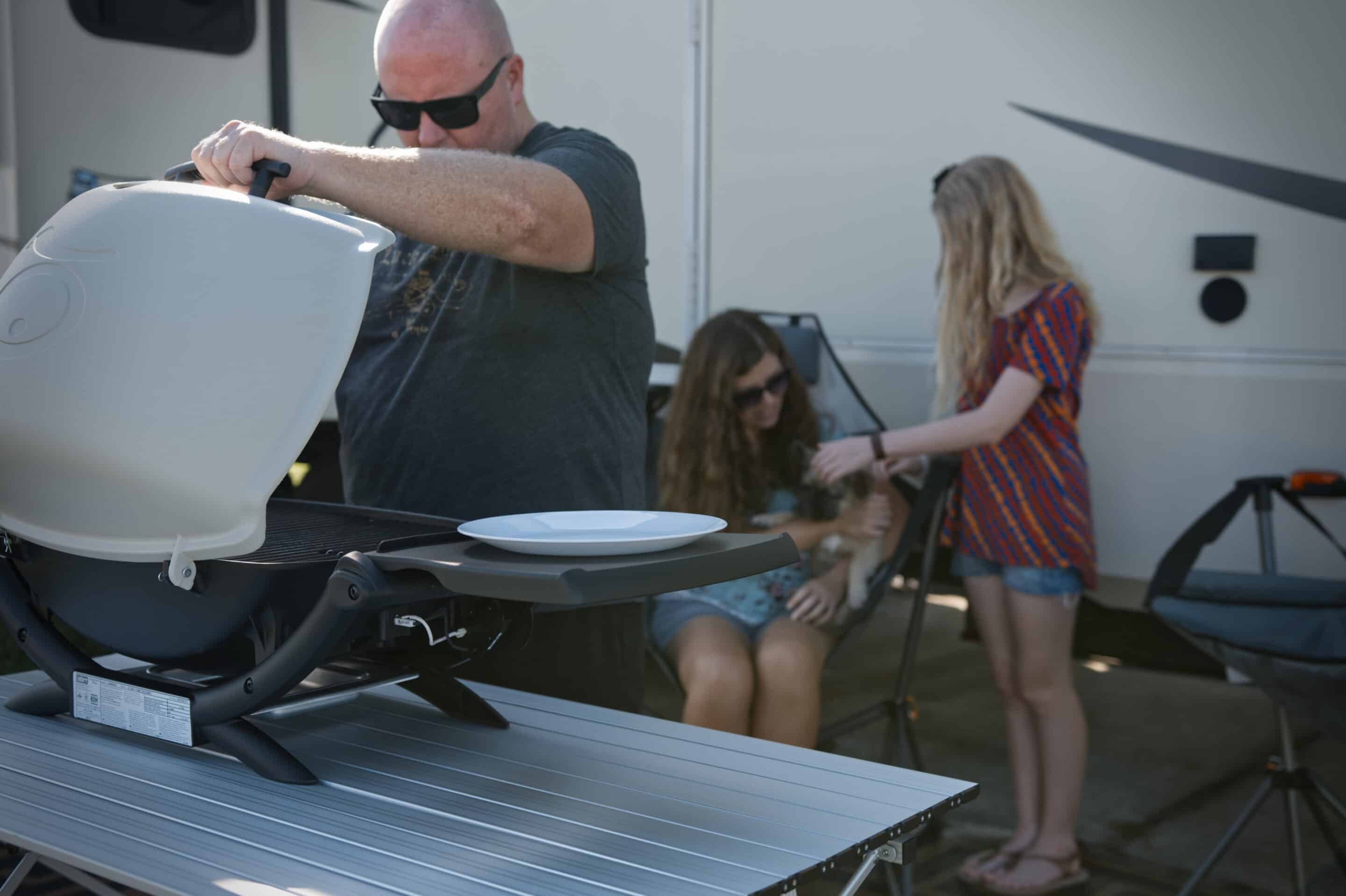
13) Pet RV Safety Concerns
Camping In Areas With Wild Animals
When camping in areas with wild animals, it’s important to be cautious with your pets.
Always keep your pets on a leash and never leave them unattended outside.
Wildlife safety is crucial, as some animals, like coyotes and bears, may be attracted to the scent of pet food or can pose a threat to your furry companions.
Make sure to properly secure and store all pet food and trash to avoid attracting predators.
Pet Risk Of Overheating In RV
Another concern for pet owners while living in an RV is the risk of overheating.
As some RVs aren’t well insulated, leaving your pets inside during hot weather can be dangerous.
Your pet can quickly get into trouble with heat if the power or air conditioner shuts off while you are out.
On extremely hot days, consider taking your pets with you when you leave the RV.
An even better solution is to use a device such as Waggle that monitors the temperature and humidity in your RV while you are gone and sends you a text if it is getting too hot.
We spend a lot of time in Florida and worry about our French Bulldog, Oliver when we aren’t home.
Waggle has given us great peace of mind that he is comfortable and safe.
Save 50% off Waggle Pet Monitor
with code RVPUP
Here are some other tips to prevent overheating in your RV:
- Check the insulation and seal any gaps
- Use reflective sunshades to block direct sunlight from windows and roof skylights
- Ensure proper airflow with fans or air conditioning
- Monitor the environment frequently, especially during very hot or cold days
Getting Lost
Another concern for pet owners is the possibility of their pets getting lost in unfamiliar surroundings.
Make sure your pet wears a collar with identification tags and that their microchip information is up-to-date.
Additionally, you can train your pet to return when called or invest in a GPS tracking device to help locate them if they wander off.
It helps to frequently familiarize pets with their new surroundings.
14) Unknown Campground Water Quality
While living in an RV, one of the common challenges you could face is dealing with unknown water quality.
The water you use for drinking and cooking could pose a risk to your health if it’s not properly filtered.
Importance Of RV Water Filtration
Installing a water filtration system in your RV can be crucial to maintaining good health and a safe living environment.
Unfiltered water can contain contaminants such as bacteria, viruses, chemicals, and heavy metals that could lead to a variety of health issues.
By using an effective water filtration system, you can ensure that you are using clean water for your daily needs and protect yourself and your family from potential health risks.
Whole RV Filtration Versus Drinking Water Filtration
When it comes to filtering the water in your RV, you have a couple of options: whole RV filtration or drinking water filtration.
A whole RV filtration system filters all the water coming into your RV, which means that your drinking water and the water used for cooking, bathing, and other activities will be clean and free of contaminants.
This can be a good idea if you are concerned about water quality at various RV parks and campgrounds.
On the other hand, drinking water filtration focuses exclusively on the water you consume, usually installed under the kitchen sink or connected directly to the faucet.
We use an inline whole RV water filter at the spigot as well as a Travel Berkey to further filter drinking water inside next to our kitchen sink.
Ultimately, the choice between whole RV filtration and drinking water filtration will depend on your specific needs and budget.
Whichever option you choose, it’s essential to regularly maintain and replace the filters to ensure optimal performance and protection.
15) Pest Control Living In Your RV
Pests Can Damage The RV Electrical System
Pests, such as rodents or insects, can cause significant damage to your RV’s electrical system. They can chew through wires, causing shorts or even electrical fires.
To protect your RV, routinely inspect your electrical components, looking for signs of damage or gnawing.
Repair any damaged electrical wiring promptly to prevent further damage and potential safety hazards.
Pest Prevention In Storage
When storing your RV, it’s crucial to take steps to prevent pests from making it their home.
To do this, seal any gaps, cracks, or holes where pests can enter and remove any food items from your RV.
Using odor deterrents like mothballs, dryer sheets, or essential oils can also help keep pests away.
Additionally, storing your RV in a secure, indoor, pest-controlled facility can help ensure it remains pest-free during storage.
Pest Control While Camping
Pests may be attracted to your RV during camping trips due to food or shelter.
To minimize the risk of infestations, maintain cleanliness in and around your RV.
Dispose of trash regularly, store food in sealed containers, and clean food preparation surfaces.
Consider using natural pest repellents like citronella candles, essential oil sprays, or insect-repelling plants to deter pests from entering your RV.
Also, spray for ants or use diatomaceous earth powder around the RV to deter insects.
Avoiding Bug Bites – Ticks, Mosquitos, No-See-Ums
Bug bites can be a nuisance while living in an RV, so take precautions to avoid ticks, mosquitos, and no-see-ums.
Wear protective clothing like long sleeves and pants outdoors, and apply bug repellent to exposed skin.
For added protection, treat clothing and gear with products containing permethrin or natural bug spray.
Also, consider using citronella candles or torches around your campsite.
Finally, keep screens on your RV windows and doors in good repair and close them when not in use to prevent bugs from entering your living space.
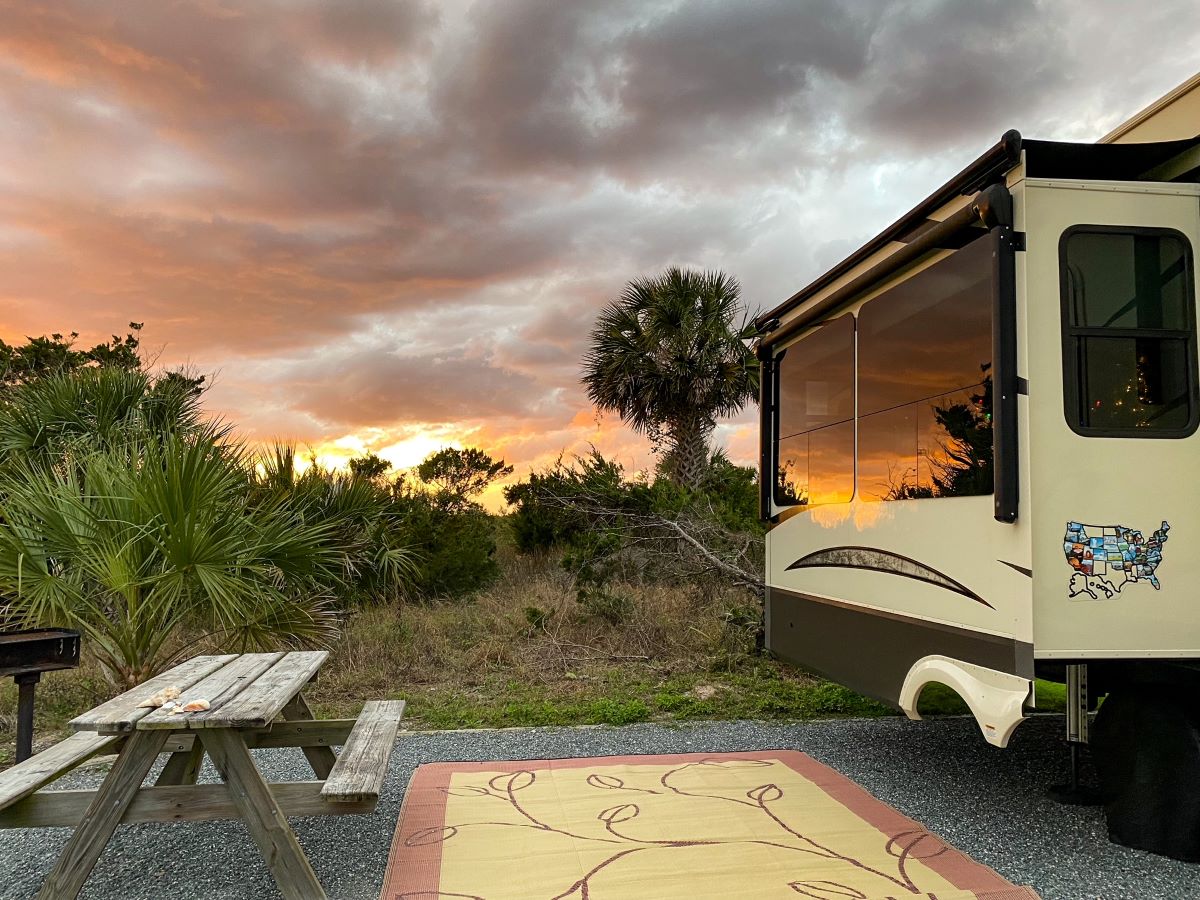
16) Air Quality Issues And Dust In A Camper
Wildfire Smoke
If you live in an RV, wildfire smoke can be a significant concern, especially if you are traveling in areas prone to wildfires.
The smoke can easily make its way into your RV, causing poor air quality and potential health issues, such as respiratory problems and eye irritation.
It is crucial to be aware of the fire risks in the areas you are staying in and take precautions to steer clear of wildfire-affected regions.
Exhaust From Nearby RVs Or RV Generators
Exhaust fumes from other RVs or RV generators can also affect your RV’s air quality.
These fumes can contain harmful pollutants, such as carbon monoxide, and can lead to respiratory issues and headaches if not addressed.
It is essential to maintain a safe distance from other vehicles when camping and ensure that proper ventilation is in place in your RV to prevent unhealthy air from accumulating inside.
Off-Gassing Of RV Composite Materials And Glues
Some new or recently renovated RVs can release volatile organic compounds (VOCs) from composite materials and glues used in their construction, which may negatively impact your indoor air quality.
Exposure to high levels of VOCs can cause a range of health problems.
Symptoms of VOC exposure include dizziness, headaches, and respiratory issues.
To minimize exposure, consider airing the RV before living in it full-time and giving the off-gassing process time.
Solution: Get A Small Air Purifier That Removes VOCs Such As Blue Air
A practical solution to improving your RV’s air quality is investing in a small air purifier that removes VOCs, such as a Blue Air purifier.
These devices work by filtering out air pollutants and allergens, helping alleviate present concerns like wildfire smoke, exhaust fumes, or off-gassing.
We use a compact model Blue Air purifier in our bedroom, which has been great for RV living.
17) Electromagnetic Fields
Living in an RV, you’re surrounded by a variety of electronic devices and appliances that emit electromagnetic fields (EMFs).
EMFs are invisible areas of energy produced by both natural and human-made sources.
While low-frequency EMFs are generally considered safe, long-term exposure to higher levels may have potential health effects.
Avoid Staying Next To Power Substations And Cell Phone Towers
One of the top sources of EMFs are power substations and cell phone towers.
To minimize your exposure to EMFs while living in an RV, try to avoid parking or staying next to these structures.
These sources emit stronger EMFs, and being in close proximity may increase your potential risk of health issues due to EMF exposure.
When choosing your RV parking spot, be mindful of your surroundings and keep a safe distance from these EMF sources.
18) Behind On Healthcare And Skipped Check-Ups Full-Time RVing
Living in an RV can sometimes present challenges when it comes to healthcare.
In this section, we’ll examine some of the factors that can lead to you falling behind on healthcare and skipping check-ups.
Overindulgence
Living on the road makes it easy to overindulge in unhealthy habits, like eating fast food, sitting for long periods, or drinking too much around the campfire.
It’s also tempting to want to try all the local foods and to eat out often while on the go.
Keep these factors in mind so they don’t catch up with you on the road.
Limited Access To Healthcare
Traveling in an RV can sometimes feel limiting in regard to healthcare services, especially when you are staying out in the middle of nowhere.
This can make it more difficult to receive timely care when needed.
It helps to carry first aid items, over-the-counter items, and natural healthcare options along with you in your RV.
We have a full set of herbs, essential oils, and a set of homeopathic remedies to care for many day-to-day situations naturally as they pop up.
This can be helpful to have while traveling.
Not Knowing Which Care Provider Is Good While On The Road
When you’re on the road, it can be challenging to find a reliable healthcare provider, especially in unfamiliar locations.
Tips For Finding Healthcare When RV Traveling
Here are some practical tips to help you locate healthcare resources when you are far from home.
Consider Using Telehealth Services
One option to consider for addressing your healthcare needs while RV traveling is utilizing telehealth services.
Telehealth platforms connect you with healthcare providers via video calls or messaging, allowing you to access professional medical advice without visiting a physical location.
This can be particularly helpful for minor health issues, prescription refills, or consultations.
Ensure you have a reliable internet connection and research telehealth providers that meet your needs before embarking on your journey.
Look For A Doc In A Box Located Near You
Another alternative for receiving medical services on the go is seeking out Doc in a Box clinics.
These walk-in clinics provide quick and convenient care for non-emergency health issues.
Often found near shopping centers or major highways, they are an excellent resource for RV travelers seeking care for minor illnesses, injuries, or routine tests.
Just search for “Doc in a Box” to find clinics along your travel route.
Walk-In Pharmacy Clinics Can Be A Great Option
Many pharmacies offer walk-in clinics for routine healthcare needs, such as basic screenings and minor health issues.
Large chain pharmacies often have a network of locations across the country, increasing your chances of finding a nearby facility.
Ask The Campground Staff For Local Care Recommendations
When staying at a campground, don’t hesitate to ask the staff for recommendations on local healthcare providers.
They can share their knowledge of nearby doctors, dentists, or other medical professionals and may even be able to provide directions or contact information.
Keep in mind that their suggestions should be researched to ensure they meet your specific healthcare needs.
Use Urgent Care When Needed
Urgent care centers can be a valuable resource for addressing more severe health issues that require immediate attention.
These facilities typically offer extended hours and a broader range of services than walk-in clinics but are not equipped for life-threatening emergencies.
Our daughter’s eardrum burst while hauling our fifth wheel through a mountain pass in Oregon.
It was a scary time with blood and pain. Luckily, we found an urgent care near the campground that took our insurance and provided excellent care.
By incorporating these tips into your RV travel plans, you can be better prepared to access healthcare when necessary, allowing you to continue enjoying your adventures with peace of mind.
Learn how we grab tough and even sold-out Camping Reservations in our FREE GUIDE HERE!
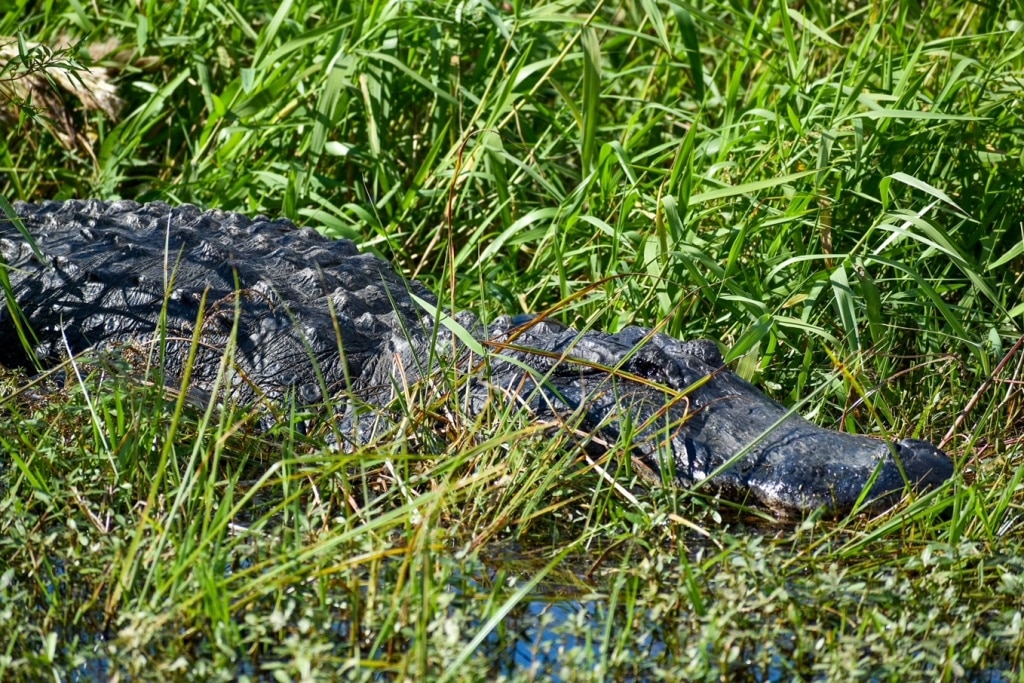
19) Wildlife Safety While RVing
When living in an RV, you’ll likely encounter wild animals as you explore the great outdoors.
Although this interaction can provide unique experiences and can be exciting, it’s important to be aware of potential dangers and prepare accordingly.
First, educate yourself about the wildlife native to the areas you plan to visit in the United States.
Familiarize yourself with their habits, predators, and defensive behaviors to know how to anticipate any encounters and react appropriately.
Give Them Some Space
Keep in mind that wild animals, even those that appear harmless, can be unpredictable. Use common sense and maintain a safe distance from wildlife at all times.
Avoid approaching them as they may perceive it as a threat, possibly leading to an attack or provoking a defensive reaction.
Proper Food And Trash Storage
Additionally, one of the best ways to minimize wildlife encounters is to store your food securely.
Wild animals have a keen sense of smell and may be attracted to your campsite in search of food.
Use airtight containers and keep all food, trash, and cooking materials inside your RV or secured lockers whenever possible.
This will help deter animals from approaching your campsite.
Another crucial aspect of wildlife safety is understanding the laws and regulations surrounding wildlife interaction in the places you visit.
Some areas have strict rules regarding feeding or interacting with animals, and disregarding these rules could result in fines or other legal issues.
As you continue exploring new places in your RV, remember that being respectful of wildlife contributes to your safety and the animal’s well-being.
Enjoy your encounters with nature as safely as possible.
Are You Prepared For An Emergency In Your RV?
First Aid Supplies
It’s essential to have a well-stocked first aid kit in your RV.
This should include bandages, gauze, antiseptic wipes, pain relievers, and any necessary medications. Make sure to routinely check the kit for expired items and replenish it as needed.
Weather Radio Or Phone Weather Apps
Stay informed about ever-changing weather conditions by having a weather radio or phone weather app with alerts turned on.
This will help you stay ahead of severe weather, allowing you time to move your RV to safety or prepare for incoming storms.
Grab And Go Important Family Documents
Having important documents ready to leave in a hurry is crucial in case of an emergency.
Keep a folder containing passports, insurance cards, vehicle registration, and any essential medical information in a safe but easy-to-access location in your RV.
Fire Extinguisher
RV fires can spread quickly and may be life-threatening.
It’s crucial to have a fire extinguisher on board and know how to use it properly. E
nsure that everyone in your family is familiar with its location and how to use it.
Carry Emergency Numbers With You Such As Roadside Assistance
Keep a list of essential emergency numbers, including roadside assistance.
Having these on hand will save precious time if you need to make an urgent call.
Store the list in your phone and have a physical copy in the RV for quick reference.
Establish A Family Plan For Possible Emergencies While RV Traveling
Develop a family plan for dealing with emergencies while on the road.
This should include designated meeting spots, agreed-upon communication methods, and ways to ensure everyone’s safety.
Practice using fire exits in the RV as part of this plan. Regularly review and update the plan and make sure each family member is familiar with it.
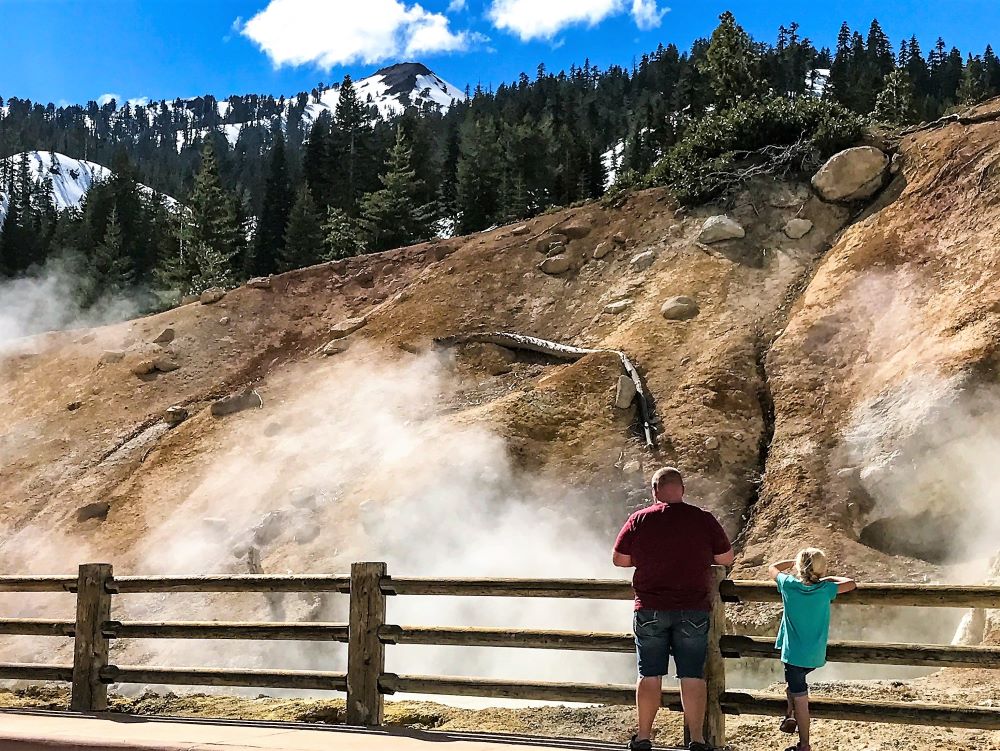
FAQs Dangers Of Living In An RV and RV Safety
What are the common health hazards when living in an RV?
Common health hazards when living in an RV can include unknown campground water quality, RV mold due to condensation, and a risk of carbon monoxide.
Always check carbon monoxide and fire detectors regularly. Also, use an RV water filtration system and dehumidifier.
How does living in an RV impact safety and security?
Living in an RV poses a few safety and security challenges, including theft, fire risk, and increased accident risk on the road.
It’s important to have seats with seatbelts for every RV passenger. Also, make sure doors, storage hatches, and bikes are locked when not using them.
Keep at least one fire extinguisher in your RV at all times.
What are the dangers of a propane leak in an RV?
The dangers of a propane leak in an RV include an increased risk of fire or explosion, as well as the potential for carbon monoxide poisoning.
Symptoms of carbon monoxide poisoning include nausea, dizziness, and headaches, so it’s crucial to have a functioning carbon monoxide detector on board to alert you of any hazardous leaks.
Are safety chains required on a fifth wheel RV?
Safety chains are not required on a fifth wheel RV. Safety chains are however required in most states for conventional travel trailers.
Fifth wheels have a specialized hitch that connects directly to the tow vehicle’s bed, providing a secure and stable connection.
How can you childproof an RV to keep kids safe inside?
You childproof an RV in similar ways to a home to keep kids safe. Use child safety seats in an RV for travel days. Secure cabinets and drawers that hold chemicals, knives, or other harmful items. Consider using a baby gate to block off RV stairs or the RV door area.
What emergency equipment or supplies should RVers keep on hand in case of accidents, injuries or disasters?
Always keep a first aid kit in your RV and vehicle just in case. Make sure you have flashlights and working fire extinguishers in your RV. Stock your roadside kit with flares and reflective triangles.
Have a go bag ready with important papers, medications, or other must haves in case you need to evacuate your RV in a hurry.
What are some tips for securing your RV when you need to leave it for extended periods of time?
Install a pin box or hitch lock on your RV to deter theft when your RV isn’t in use. Also consider using a solar motion activated light and/or security camera.
You could also install a boot on golf carts. Make sure all hatches are locked and any other exterior items such as bikes are chained to the RV.
Your RV Safety Is Covered Now That You Know The Dangers Of Living In An RV
While the RV lifestyle can offer you adventure, flexibility, and the chance to explore new places, it also comes with a responsibility to have a plan to handle any dangers of living in an RV.
By being prepared for your journey and maintaining a level of vigilance about RV safety, you can avoid potential risks and enjoy your adventure!
Learn how we grab tough and even sold-out Camping Reservations in our FREE GUIDE HERE!
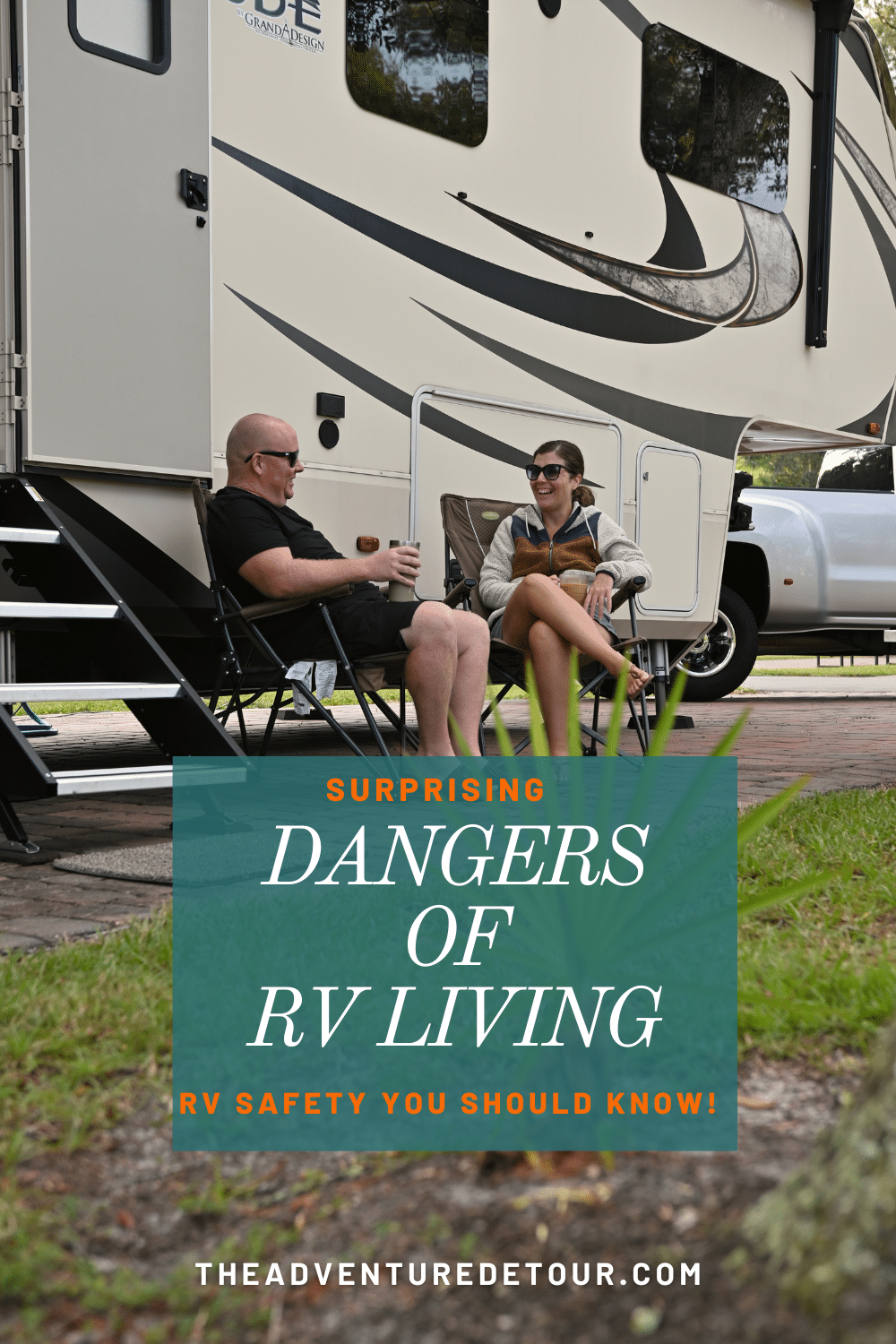
Scott and Van of The Adventure Detour are travel writers focusing on RV travel, family outdoor travel, national parks travel, and hiking. They have been full-time RV living and traveling across the US since 2015. In 8 years of full-time RVing, they have visited 38 national parks so far with the ultimate goal to see them all. They work as digital nomads while roadschooling their daughter nicknamed Sissy. On the way to all 50 states, they have visited and hiked through 42 states so far. The travel bucket list is forever growing!

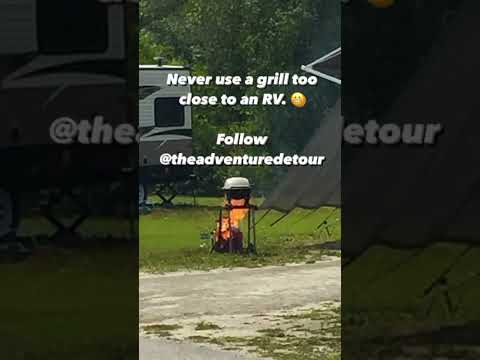
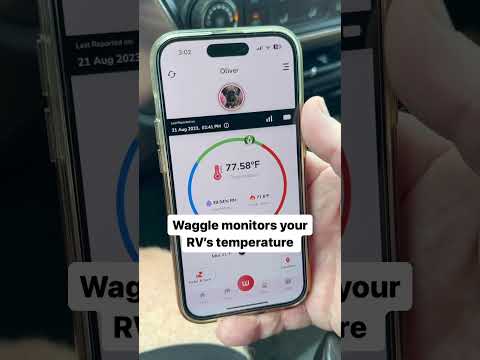

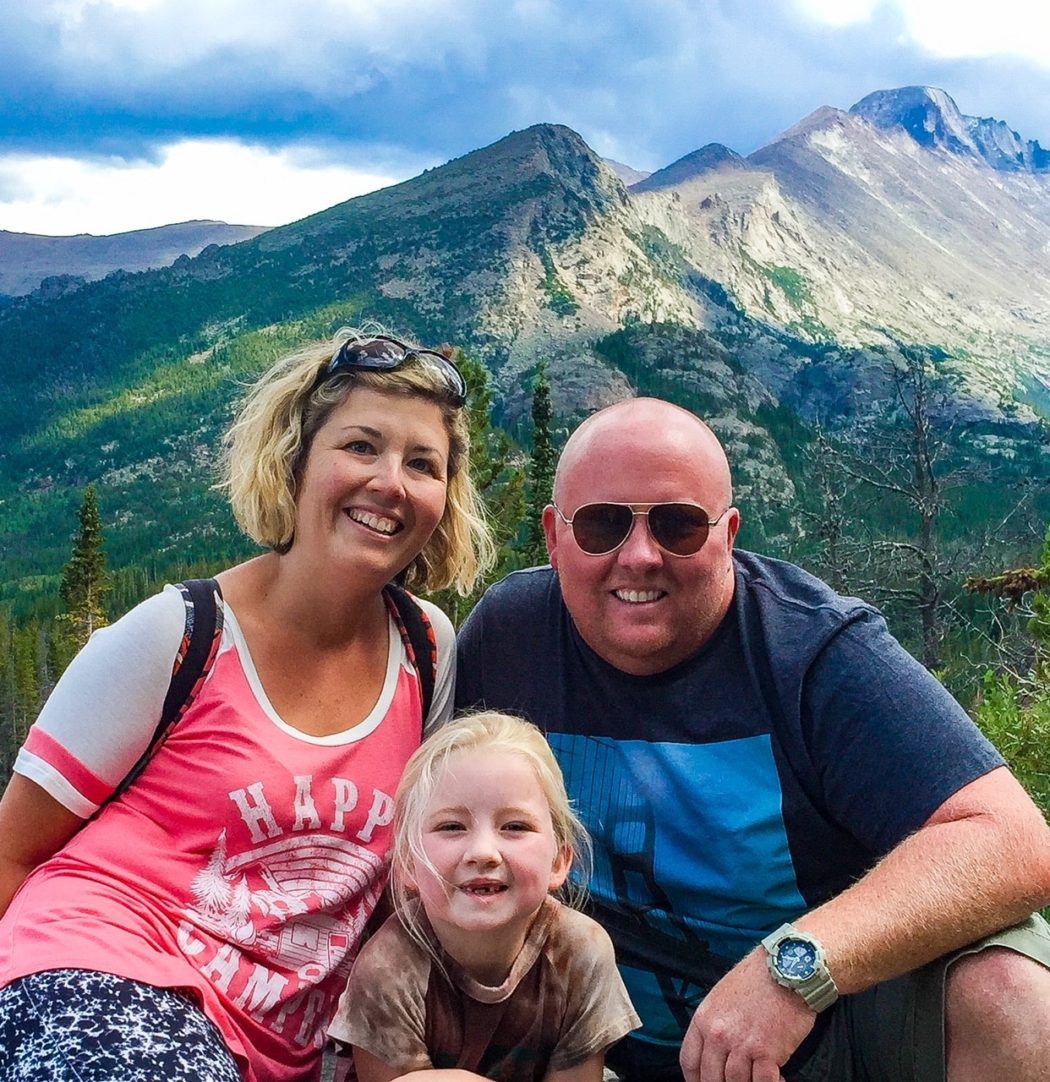
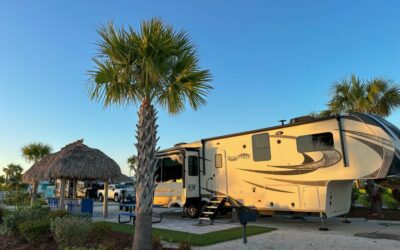
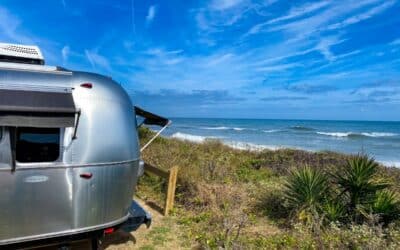
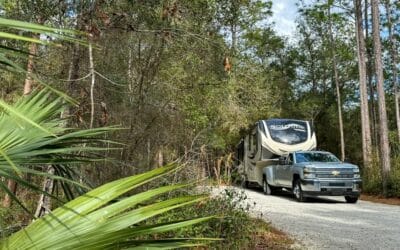

Radon danger living in a old motorhome,??
Hi Wanda!
This is a great question. I think you are referring to carbon monoxide. Carbon monoxide detectors actually expire so make sure to replace the detector just in case. You can get carbon monoxide gas from the motorhome, surrounding RVs, or generators so it’s important to have a working detector. Radon is a concern in some homes but luckily not in RVs. I hope this helps! Safe travels.
Scott
[email protected]
Hi im Marlene I was wondering can I lived in a rv year round I’m not moving very much. Tired paying 900.00 for electricity per month my mini home have bad windows I’m tired living in it needs fixing a lot I’m alone need comfort now just wondering if you have anything year round
Hi Marlene!
That is an expensive electric bill. It is possible to live year round in an RV at an RV park. While RV park rent may be cheaper, RVs do break often and you do have to pay electricity for long term stays. Those are some things to consider when thinking about living in an RV.